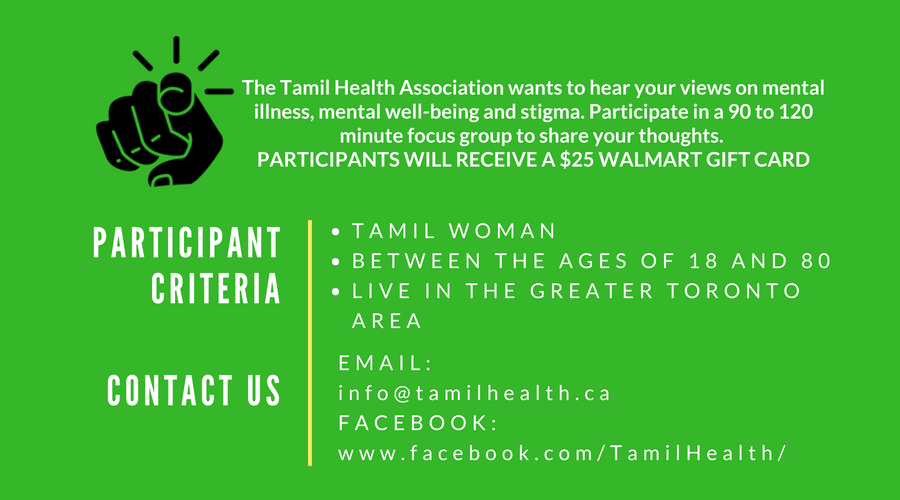
Canada is home to approximately 140,000 Sri Lankan Tamils (1), many of whom were refugees and victims of atrocities during the Sri Lankan civil war. Post-war trauma and integration stressors in a new country have a profound impact on health. Mental health is severely impacted, but often relegated by the Tamil community to the sidelines for physical health and the pressing demands of everyday life. This is further exacerbated by a prevailing stigma towards mental illness within the community.
The intergenerational transfer of mental illness has been found in refugee populations, negatively impacting the mental health of refugees’ children and familial relationships (2)(3). Existing literature focuses on the effects of pre-immigration trauma or treatment outcomes for mental illness for Canadian Tamils. The lack of literature on mental health promotion and prevention strategies is apparent despite the fact that health promotion and prevention has a significant effect in reducing mental illness (4).
Research has found that Tamils avoid taking medication and seeing doctors as these actions have the connotation of “being sick” (5). They often turn to family and friends to cope with stress (6), indicating a need for awareness around the importance of mental health and preventative measures through culturally-sensitive, population-specific methods.
Community discussions held by the Tamil Health Association (THA) reveal that Canadian Tamil women face unique stressors that differ by generation. First generation Tamil women are pressured to conform to cultural values and uphold family reputation, resulting in restricted social lives, moral policing by family members, and anxiety over assimilation in a Western environment (7). Older Tamil women are typically the primary family caregivers and are expected to fulfill the role of the “traditional Tamil mother” (e.g. cooking, household chores) while contributing to household income through wage work. These stressors are not experienced to the same degree by Tamil boys and men.
Given these findings and observations, THA is setting out to create a health promotion program that can be used to help Tamil women across multiple generations take charge of their mental health. We would like to achieve this by conducting focus groups with Tamil women aged 18 to 80 to understand their thoughts on mental health, causes of mental illness, and barriers to accessing resources and strategies to overcome these barriers. The findings from the focus groups will inform the intergenerational health promotion program which will aim to improve mental health and reduce stigma to promote strength and overall well-being of Tamil women, their families, and the larger Tamil community.
We are hoping this study will reduce stigma within the Tamil community when it comes to mental health and shed light on different factors that contribute to one’s mental health (such as income, education and environment), as well as promoting dialogue about stressors and barriers to mental well-being across multiple generations of Tamil women.
In November 2017, the THA successfully received the 15K Challenge Grant through the Women’s Xchange Program by the Women’s College Hospital for this research project. The challenge encouraged organizations to produce local research that would aid in improving the overall health of women and girls. This is the second time THA has joined the ranks of small-scale community-initiated research programs funded by the Xchange program, the first being the Healthy Food Program in 2014. THA has also recently received ethics approval from the Community Research Ethics Board (CREB), giving the study the green light to move onto the next stage.
We need your help!
THA is looking to recruit Sri Lankan Tamil women aged 18-80 that live in the Greater Toronto Area (GTA) to participate in our bilingual (Tamil and English) focus groups on mental health and well-being. A focus group is a facilitated discussion with a diverse group of individuals where participants are asked detailed information about personal and group feelings, their perspectives and opinions. If you or someone you know would like to be a participant in our focus groups, please contact us at [email protected] or message us on Facebook at https://www.facebook.com/TamilHealth/.
References
1. Statistics Canada. 2017. Census Profile. 2016 Census. Statistics Canada Catalogue no. 98-316-X2016001. Ottawa. Released September 13, 2017. http://www12.statcan.gc.ca/census-recensement/2016/dp-pd/prof/index.cfm?Lang=E (accessed October 4, 2017).
2. Dean K, Stevens H, Mortensen P, Murray R, Walsh E, Pedersen C. Full Spectrum of Psychiatric Outcomes Among Offspring With Parental History of Mental Disorder. Archives of General Psychiatry. 2010;67(8):822.
3. Sangalang C, Jager J, Harachi T. Effects of maternal traumatic distress on family functioning and child mental health: An examination of Southeast Asian refugee families in the U.S. Social Science & Medicine. 2017;184:178-186.
4. Andrews G, Issakidis C, Sanderson K, Corry J, Lapsley H. Utilising survey data to inform public policy: comparison of the cost-effectiveness of treatment of ten mental disorders. The British Journal of Psychiatry. 2004;184(6):526-533.
5. Pandalangat N, Rummens J, Williams C, Seeman M. The Social Dimensions of Health and Illness in the Sri Lankan Tamil Diaspora- Implications for Mental Health Service Delivery. World Journal of Preventive Medicine. 2013;1(3):36-42.
6. Douglin M. Making connections: Greek and Sri Lankan Tamil perceptions of mental health, ways of coping, and help-seeking [Internet]. Waterloo, ON: Wilfred Laurier University; 1998. Available from: http://scholars.wlu.ca/etd/671/
7. Tyyskä V. Teen perspectives on family situations in the Toronto Tamil community. [Toronto, Ont.]: CERIS; 2006.

























